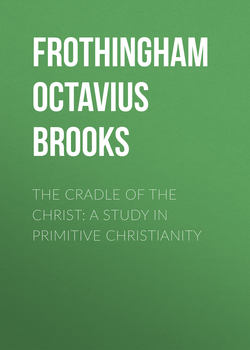The Cradle of the Christ: A Study in Primitive Christianity

Реклама. ООО «ЛитРес», ИНН: 7719571260.
Оглавление
Frothingham Octavius Brooks. The Cradle of the Christ: A Study in Primitive Christianity
PREFACE
I. FALSE POSITION OF THE NEW TESTAMENT
II. THE MESSIAH
III. THE SECTS
IV. THE MESSIAH IN THE NEW TESTAMENT
V. THE FIRST CHRISTIANS
VI. PAUL'S NEW DEPARTURE
VII. THE LAST GOSPEL
VIII. THE WESTERN CHURCH
IX. JESUS
AUTHORITIES
Отрывок из книги
The original purpose of this little volume was to indicate the place of the New Testament in the literature of the Hebrew people, to show in fact how it is comprehended in the scope of that literature. The plan has been widened to satisfy the demands of a larger class of readers, and to record more fully the work of its leading idea. Still the consideration of the New Testament literature is of primary importance. The writer submits that the New Testament is to be received as a natural product of the Hebrew genius, its contents attesting the creative power of the Jewish mind. He hopes to make it seem probable to unprejudiced people, that its different books merely carry to the last point of attenuation, and finally exhaust the capacity of ideas that exerted a controlling influence on the development of that branch of the human family. To profundity of research, or originality of conclusion, he makes no claim. He simply records in compact and summary form, the results of reading and reflection, gathered in the course of many years, kept in note books, revised year by year, tested by use in oral instruction, and reduced to system by often repeated manipulation. The resemblance of his views, in certain particulars, to those set forth by German critics of the school of Strauss or of Baur, he is at no pains to conceal. His deep indebtedness to them, he delights to confess. At the same time he can honestly say that he is a disciple of no special school, writes in the interest of no theory or group of theories, but simply desires to establish a point of literary consequence. All polemic or dogmatical intention he disavows, all disposition to lower the dignity, impair the validity, or weaken the spiritual supports of Christianity. His aim, truly and soberly speaking, is to set certain literary facts in their just relation to one another.
It has not been customary, nor is it now customary to assign to the New Testament a place among the literary productions of the human mind. The collection of books bearing that name has been, and still is regarded by advocates of one or another theory of inspiration, as of exceptional origin, in that they express the divine, not the human mind; being writings super-human in substance if not in form, containing thoughts that could not have occurred to the unaided intelligence of man, neither are amenable to the judgment of uninspired reason. To read this volume as other volumes are read is forbidden; to apply to it ordinary critical methods is held to be an impertinence; to detect errors or flaws in it, as in Homer, Plato, Thucydides, is pronounced an unpardonable arrogance. A book that contains revelations of the supreme wisdom and will must be accepted and revered, must not be arraigned.
.....
The literary method avoids the dogmatical embarrassments incident to the supernatural theory; offers easy solutions of difficult problems; connects incidents with their antecedents; interprets dark sayings by the light of association; and places fragments in the places where they belong. An exhaustive application of this treatment would probably explain every passage in the New Testament writings. A partial application of it like the present will indicate at least some of the capacities of the method.
The literary treatment differs from the dogmatical represented by the older theologians who used the New Testament as a text book of doctrine; from the purely exegetical or critical, which consisted in the impartial examination of its separate parts; from the destructive or decomposing treatment pursued by the so-called "rationalism;" and from the "historical," as employed by Baur and the "Tübingen school." It is in some respects more comprehensive and positive than either of these, while in special points it adopts all but the first. Every other method presents a controversial face, and is something less than scientific, by being to a certain degree inhospitable. This consults only the laws which preside over the literary expression given to human thoughts.
.....